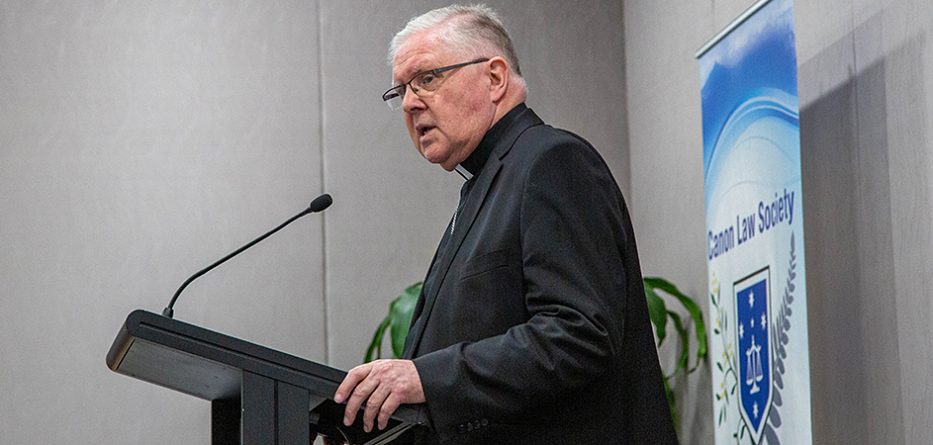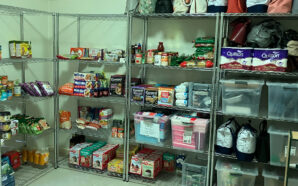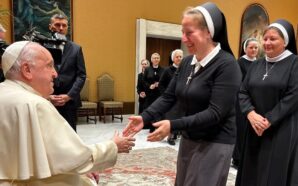Archbishop Mark Coleridge says days of the autocratic, monarchical Church “are over”; expresses confidence in German synodal path, saying talk of schism is “ridiculous”.
Pope Francis has no one in his small circle of advisors, known as the Council of Cardinals, who is from Oceania.
While the other continents have a seat in the seven-member “kitchen cabinet” or C7, Oceania’s chair has been empty since October 2018. That’s when the pope thanked Australian Cardinal George Pell for his services and removed him from the group.
There are three cardinals from Oceania who are all still under the age of 80 that could have easily taken the place of Pell – John Dew of New Zealand, John Ribat of Papua New Guinea and Soane Patita Mafi of Tonga.
But Francis did not choose any of them. And in the two consistories since Pell’s vacancy, the pope did not make any new cardinals in Oceania.
“Flashes of Insight”
It’s too bad the red hat is a requirement to fill Pell’s slot. Because if it weren’t, the pope couldn’t do any better than to choose Archbishop Mark Coleridge of Brisbane.
The 72-year-old Melbourne native and scripture scholar is probably the brightest bishop in all of Oceania. Currently the president of the Australian Bishops’ Conference, he is one of the major figures involved in preparing his country’s Plenary Council.
Coleridge recently joined Cardinal Dew and British theologian Thomas O’Loughlin – whom readers will recognise as a regular contributor to La Croix International – for an engaging and informative video discussion on synodality in the Church.
The online conversation was moderated by another LCI contributor, Joe Grayland, a presbyter and liturgist in Dew’s native New Zealand. It’s part of a new series called, “Flashes of Insight: Topical conversations about and of interest to the Catholic Church.”
All four of these priests offered more than just “flashes” of insight regarding synodality. They also raised important questions about this new and not always clear path the Jesuit pope has pushed the Church to embark upon.
Their session ran to more than an hour-and-a-half, but it went quickly. And it’s well worth the time.
An articulate voice for synodality
Mark Coleridge’s comments were particularly interesting and served as reminder why he has emerged, perhaps surprisingly to some who have known him for a long time, as one of the bishops who has embraced and has best articulated the Pope’s hopes of a synodal Church.
He acknowledged that synodality is messy, is marked by tensions and requires “holy patience”. But he said he was absolutely convinced that this “is the way forward… is what the Spirit is saying to the Church today”.
Coleridge described these early steps of trying to implement synodality as a “a moment of awakening”, which is “recentering the whole Church”. He said it is calling us “to a new kind of faith” where all vocations are being reconfigured, not just those pertaining to lay people.
The Archbishop said the “call to synodality is profoundly biblical”, showing us that we are not part of a “static, but an on-the-way Church” that is continually in process.
“Any talk of being the perfect society is simply… well, nonsense,” he said.
He called the Patriarch Abraham the “father of synodality” and pointed out that “journeying” is the root metaphor of the Bible.
“It is dislocation, moving from one place to another,” the Australian archbishop said.
But he warned that this all happens at a price.
“It will involve painful decisions of what we leave behind and what we take on,” he said.
Germany: “Talk of heresy and schism is nonsense”
Of course, “autocracy and the monarchical model of Church” would be “quicker and cleaner”, he admitted. But then he said flat out: “Those days are over!”
Coleridge, in stark contrast to his fellow Australian George Pell, spoke positively of the “Synodal Path” that is currently underway in the Catholic Church in Germany.
“I have great confidence in the Germans (and) in Cardinal Marx,” he said.
And while he acknowledged that some, especially in Rome, have expressed anxiety over Germany’s synodal experiment, he reject the dire warnings and condemnations even some senior clerics have expressed.
“All this talk about heresy and schism… I just think, frankly, is ridiculous,” he said.
And he went as far to say that, “as long as there is a robust dialogue” between Germany and the Vatican, the Synodal Path “will prove to be a gift not only for Germany, but to the Church around the world”.
Speaking about of the Plenary Council of Australia, Archbishop Coleridge said he was “utterly convinced” that the decision to open this process was made “under the influence of the Holy Spirit”.
“I’m expecting surprises, like at Vatican II”
“This is a Spirit moment. If that is not true, then all we are left with is politics and management. And neither is nearly enough to face this moment of crisis we’re facing. And it is a crisis. No way around it,” he said.
“My hope is that the Spirit will surprise us all and show us ways we hadn’t imagined,” Coleridge said.
“So I’m expecting some surprises at the assemblies,” he reiterated. “Just as we got surprises at the Second Vatican Council — no one saw coming what, in fact, came.”
There’s a lot more on the video. And not just from Mark Coleridge. John Dew, Tom O’Loughlin and Joe Grayland say important things the Church needs to ponder.
And O’Loughlin and Grayland have opened discussions on other topics, engaging bishops, theologians and Catholics active in parishes, outreach and other ministries.
They have been joined at the “Flashes of Insight” project by Michael Kelly, the Australian Jesuit priest who was instrumental in creating La Croix International, and John Murphy, a Marist Father who is one of the editors at CathNews New Zealand.
If you are looking for dialogue and good conversation that might enlighten you and help you think about current issues in the Church, then take a look at “Flashes of Insight”.
It’s just another step on the synodal journey.
Robert Mickens is a Rome-based journalist who has been reporting and commenting on the Vatican and the Catholic Church in the past three decades. He is currently editor of La Croix International, an online English version of the eminent French Catholic Daily La Croix.
Reproduced with permission from La Croix International and Robert Mickens.








